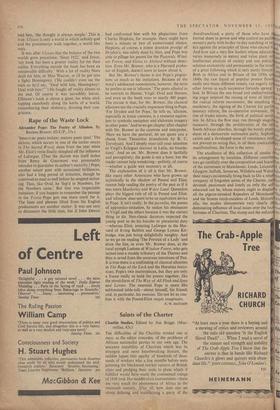Rape of the Waste Lock
Alexander Pope: The Poetry of Allusion. By Reuben Brower. (0.U.P., 35s.) 'IMMATURE poets imitate; mature poets steal.' The dictum, which occurs in one of the earlier essays in The Sacred Wood, dates from the year when Mr. Eliot's verse finally sloughed off the influence of Laforgue. (That the dictum was itself stolen from Remy de Gourmont was presumably intended to guarantee its author's maturity.) Pope, another minor poet with occasional brilliances, also had a long period of imitation, though he contrived to steal as well before he stopped imitat- ing. Thus, like Ovid, he lisp'd in Numbers, for the Numbers came.' But that was respectable imitation; if you happen to remember the passage in the Tristia Pope gets one more mark for it. The lines and phrases lifted from his English predecessors are another matter. It was not easy to disconcert the little man, but if John Dennis had confronted him with his plagiarisms from Charles Hopkins, for example, there might have been a minute or two of embarrassed silence. Hopkins, of course, a minor drunken protégé of Dryden's, was safely dead by then, and Pope was able to pillage his poems for the Pastorals, Wind- sor Forest, and Eloisa to Abelard without detec- tion. Even Mr. Brower, who is a Harvard profes- sor of English, doesn't seem to know about it.
But Mr. Brower's theme is not Pope's plagiar- isms so much as his imitations. Because of the word's adolescent connotation, however, the term he prefers to use is 'allusion.' The poets alluded to he restricts to Homer, Virgil, Ovid and Horace, and even so the book runs to nearly 400 pages. The excuse is that, for Mr. Brower, the classical allusions are the crucially important thing in Pope. `For Dryden and for Pope,' he tells us, 'allusion, especially in ironic contexts, is a resource equiva- lent to symbolic metaphor and elaborate imagery in other poets.' And so we get chapter after chapter with Mr. Brower as the cicerone and interpreter. 'Here we have the pastoral; let me quote you a chunk from Theocritus (translation by R. C. Trevelyan). And I simply must call your attention to Virgil's Eclogues (extract in Latin, no transla- tion).' And so on. Mr. Brower does it tactfully and perceptively; the guide is not a bore; but the reader cannot help wondering—politely, of course —whether a guide was necessary at all.
The explanation of it all is that Mr. Brower, like many other Americans who have grown up stylistically in the shadow of Pound and Eliot, cannot help reading the poetry of the past as if it was more Mauberley and Waste Land. Quotation plays the biggest role of all in Pound and Eliot, and `allusion' does seem to be an equivalent device in Pope. It isn't really. In the juvenilia, the poems of apprentice-imitation, he makes his obeisances to Virgil and the others because it was the correct thing to do. Neo-classic decorum expected the young poet to do his bucolic or piscatorial duty —whereas Eliot, imitating Laforgue in the Har- vard of Irving Babbitt and George Lyman Kit- tredge, was just being delightfully naughty. And so we go on reading 'The Portrait of a Lady' and draw the line, as even Mr. Brower does, at the rural nymph Lodona of Windsor Forest, who gets turned into a muddy tributary of the Thames and thus is saved from the amorous intentions of Pan. It is true there is a scaffolding of classical allusions in The Rape of the Lock and the Horatian Imita- tions, Pope's two masterpieces, but they are only a frame really to hold the poems together, like the novel-form of The Way of All Flesh and Sons and Lovers. The essential Pope is more like sublimated table-talk—about himself, his friends and, in particular, his enemies. Do not let us con- fuse it with the Pound-Eliot musee imaginaire.
F. W. BATESON










































 Previous page
Previous page